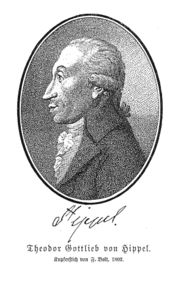
Theodor Gottlieb von Hippel
Encyclopedia

Germany
Germany , officially the Federal Republic of Germany , is a federal parliamentary republic in Europe. The country consists of 16 states while the capital and largest city is Berlin. Germany covers an area of 357,021 km2 and has a largely temperate seasonal climate...
satirical and humorous writer
Writer
A writer is a person who produces literature, such as novels, short stories, plays, screenplays, poetry, or other literary art. Skilled writers are able to use language to portray ideas and images....
.
Hippel was born at Gerdauen
Zheleznodorozhny, Kaliningrad Oblast
Zheleznodorozhny , prior to 1946 known by its German name Gerdauen, is an urban locality in Pravdinsky District of Kaliningrad Oblast, Russia, located southeast of Kaliningrad, near the border with Poland...
in the Kingdom of Prussia
Kingdom of Prussia
The Kingdom of Prussia was a German kingdom from 1701 to 1918. Until the defeat of Germany in World War I, it comprised almost two-thirds of the area of the German Empire...
, where his father was rector
Rector
The word rector has a number of different meanings; it is widely used to refer to an academic, religious or political administrator...
of a school. He enjoyed an excellent education at home, and in his sixteenth year he entered the University of Königsberg
University of Königsberg
The University of Königsberg was the university of Königsberg in East Prussia. It was founded in 1544 as second Protestant academy by Duke Albert of Prussia, and was commonly known as the Albertina....
as a student of theology
Theology
Theology is the systematic and rational study of religion and its influences and of the nature of religious truths, or the learned profession acquired by completing specialized training in religious studies, usually at a university or school of divinity or seminary.-Definition:Augustine of Hippo...
. Among his instructors was the philosopher Immanuel Kant
Immanuel Kant
Immanuel Kant was a German philosopher from Königsberg , researching, lecturing and writing on philosophy and anthropology at the end of the 18th Century Enlightenment....
and the two became close friends. Interrupting his studies, he went, on the invitation of a friend, to St Petersburg, where he was introduced at the brilliant court of the empress Catherine II
Catherine II of Russia
Catherine II, also known as Catherine the Great , Empress of Russia, was born in Stettin, Pomerania, Prussia on as Sophie Friederike Auguste von Anhalt-Zerbst-Dornburg...
. Returning to Königsberg
Königsberg
Königsberg was the capital of East Prussia from the Late Middle Ages until 1945 as well as the northernmost and easternmost German city with 286,666 inhabitants . Due to the multicultural society in and around the city, there are several local names for it...
he became a tutor
Tutor
A tutor is a person employed in the education of others, either individually or in groups. To tutor is to perform the functions of a tutor.-Teaching assistance:...
in a private family; but, falling in love with a young lady of high position, his ambition was aroused, and giving up his tutorship he devoted himself with enthusiasm to legal studies. He was successful in his profession, and in 1780 was appointed chief burgomaster in Königsberg, and in 1786 privy councillor of war and president of the town. As he rose in the world, however, his inclination for matrimony vanished, and the lady who had stimulated his ambition was forgotten. He died at Königsberg on the 23rd of April 1796, leaving a considerable fortune.
Hippel had extraordinary talents, rich in wit and fancy; but his was a character full of contrasts and contradictions. Cautiousness and ardent passion, dry pedantry and piety, morality and sensuality; simplicity and ostentation composed his nature; and, hence, his literary productions never attained artistic finish. In his Lebenslaufe nach aufsteigender Linie (1778-1781) he intended to describe the lives of his father and grandfather, but he eventually confined himself to his own. It is an autobiography
Autobiography
An autobiography is a book about the life of a person, written by that person.-Origin of the term:...
, in which persons well known to him are introduced, together with a mass of heterogeneous reflections on life and philosophy. Kreuz- and Querzüge des Ritters A bis Z (1793-1794) is a satire levelled against the follies of the age–ancestral pride and the thirst for orders, decoration and the like.
Among others of his better known works are Über die Ehe (1774) and Über die bürgerliche Verbesserung der Weiber (1792). In the latter essay, Hippel argues that the natural traits of women make them superior for many tasks, especially education. According to Jane Kneller, Hippel's "central claim" in this essay is that "excluding women from the public square is a travesty of justice that prevents the advancement of humanity toward genuine civilization." Timothy F. Sellner has produced an English translation of this work under the title On Improving the Status of Women. Hippel has been called the fore-runner of Jean Paul
Jean Paul
Jean Paul , born Johann Paul Friedrich Richter, was a German Romantic writer, best known for his humorous novels and stories.-Life and work:...
, and has some resemblance to this author, in his constant digressions and in the interweaving of scientific matter in his narrative. Like Richter he was strongly influenced by Laurence Sterne
Laurence Sterne
Laurence Sterne was an Irish novelist and an Anglican clergyman. He is best known for his novels The Life and Opinions of Tristram Shandy, Gentleman, and A Sentimental Journey Through France and Italy; but he also published many sermons, wrote memoirs, and was involved in local politics...
. He never married.
In 1827-1838 a collected edition of Hippel's works in 14 volumes was issued at Berlin. Über die Ehe has been edited by E Brenning (Leipzig, 1872), and the Lebenslaufe, nach aufsteigender Linie has in a modernized edition by A von Ottingen (1878), gone through several editions. See J Czerny, Sterne, Hippel and Jean Paul (Berlin, 1904).

